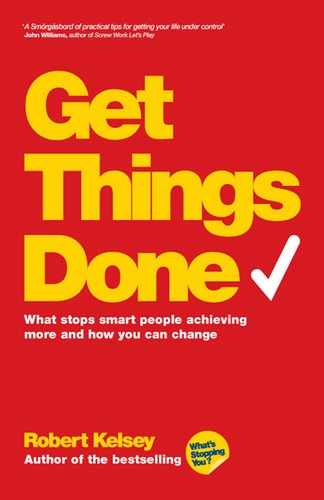Book Description
Robert Kelsey's What's Stopping You? has become a self-help classic. His What's Stopping You? books have helped thousands of people worldwide overcome their limiting beliefs and bash through their barriers to success. Now Robert is back to help us defeat the obstacles that stop us achieving more in our everyday lives. Many of us have the greatest of intentions but find ourselves procrastinating, which results in low attainment and frustrated ambitions. Grounded in solid psychological research Robert helps us examine why we might have these tendencies and how to overcome them in order to feel more together, in control and on-top of everything.
Looks at the psychology behind why we procrastinate, in order to understand and change our behaviour, forming new, effective habits
Provides practical solutions to help us 'get things done' in real life situations including meetings, on the phone, with e-mail, looking for a job and starting a business
Includes techniques to improve focus and aid concentration
Examines how disorganisation is not innate and how we can learn processes that will allow us to be more effective
How to bring control to certain areas of your life and reduce stress and uncertainty
Get Things Done is emotional ergonomics for the organisationally-challenged individual - at home, at work, with themselves, and with others.
Table of Contents
- Cover
- Endorsements
- Title page
- Copyright page
- Dedication
- Introduction: My Own Personal Chaos
- PART ONE: The Unproductive Mind
- PART TWO: Tools and Resources
- 5: The Need for Desire
- 6: Planning for Freedom
- 7: Getting Started
- Point One: Love your workstation
- Point Two: Invest in the right equipment
- Point Three: Buy lots of stationery
- Point Four: Gather/capture everything
- Point Five: Do some filing
- Point Six: Finish that plan
- Point Seven: Write a checklist
- Point Eight: SWOT that strategy
- Point Nine: Focus
- Point 10: Make that call
- 8: Managing Time
- 9: Developing Good Habits
- 10: Making Decisions
- PART THREE: Get Things Done …
- PART FOUR: Other People
- Conclusion: ‘It's All Chaos’
- The 7 Habits of Highly Ineffective People
- Bibliography
- About Robert Kelsey
- Index
